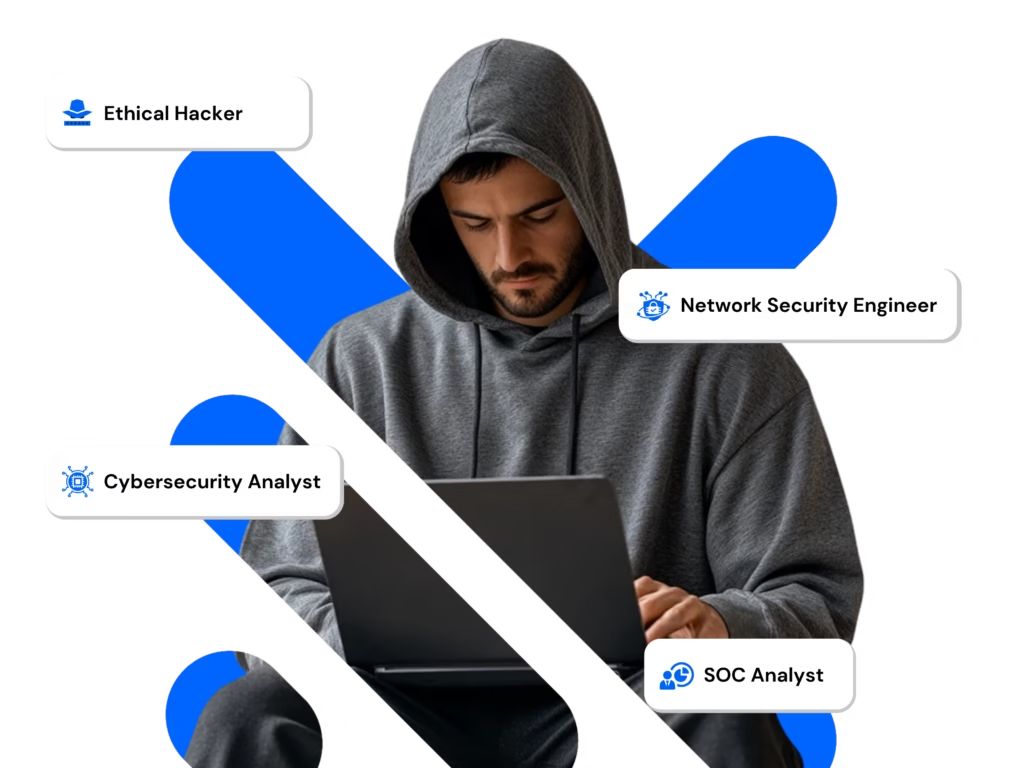
Considering a career in telecommunications and wondering if the CTIA Certification in Dehradun is the right move for you? In this article, we’ll explore the benefits, job opportunities, exam preparation tips, and current industry trends related to CTIA Certification. As cybersecurity threats grow more complex, the demand for professionals with specialized knowledge in threat intelligence is on the rise. CTIA Certification not only enhances your credibility in the cybersecurity field but also opens up new career opportunities, particularly in industries like telecommunications, finance, and government.
Whether you’re looking to advance your current role, switch careers, or simply stay ahead of the curve with the latest industry trends, CTIA Certification course in Dehradun equips you with essential skills for identifying and responding to cyber threats. With the growing need for threat intelligence professionals, earning this certification in 2025 could be a key factor in shaping your career and ensuring job security in a competitive market. Let’s dive into how CTIA Certification course in Dehradun can help you stand out and succeed in the ever-evolving cybersecurity landscape.
Table of Contents
Overview of CTIA Certification
What is CTIA Certification?
Certified Threat Intelligence Analyst course in Dehradun is a specialized credential designed to equip professionals with the knowledge and skills needed to proactively identify, analyze, and respond to cyber threats. Offered by EC-Council, CTIA in Dehradun focuses on threat intelligence, helping individuals understand how to collect, process, and analyze data to predict potential attacks and mitigate risks. The certification covers key areas like threat intelligence lifecycle, data gathering techniques, and reporting, making it essential for cybersecurity professionals such as analysts, SOC operators, and threat hunters. It is ideal for those looking to enhance their expertise in cybersecurity and threat intelligence.
Importance of CTIA Certification in the Telecommunications Industry
CTIA certification plays a crucial role in the telecommunications industry, where securing networks and safeguarding sensitive data are top priorities. As cyber threats continue to evolve, professionals with CTIA certification are equipped with the knowledge and skills to identify, analyze, and respond to these risks effectively. The certification focuses on threat intelligence, teaching individuals how to anticipate potential attacks and take preventive measures. This is especially important in telecommunications, where vast amounts of critical data are transmitted daily.
For professionals, CTIA certification training in Dehradun not only enhances their ability to handle real-world cybersecurity challenges but also boosts their career prospects. Certified individuals are highly valued in the job market, with opportunities for higher salaries and leadership roles in cybersecurity teams. For telecom companies, having certified threat analysts helps ensure network security, minimize data breaches, and maintain uninterrupted services. In a rapidly evolving digital landscape, CTIA certification has become a key asset for both professionals and organizations in the telecommunications sector.
Benefits of CTIA Certification for Career Advancement
Enhanced Credibility and Recognition
Obtaining the CTIA certification significantly enhances an individual’s credibility and recognition in the cybersecurity field, particularly within the telecommunications industry. As cyber threats grow more sophisticated, having a recognized credential demonstrates a commitment to professional development and expertise in threat intelligence. Employers and peers often view certified professionals as more knowledgeable and reliable, leading to greater trust in their abilities to manage cybersecurity risks.
The certification signals to stakeholders that the individual possesses a robust understanding of the threat intelligence lifecycle, from data collection and analysis to reporting and response strategies. This expertise not only boosts an individual’s confidence but also establishes them as a valuable asset within their organization. Enhanced credibility often translates to better job prospects, as many employers prioritize candidates with recognized certifications when hiring for cybersecurity roles.
Moreover, CTIA certification opens doors to networking opportunities within professional organizations and industry forums, further solidifying an individual’s standing in the field. As certified professionals share insights and experiences, they gain recognition as thought leaders, contributing to discussions on best practices and emerging trends in cybersecurity. In this way, the CTIA certification not only enhances personal credibility but also fosters a sense of community among cybersecurity professionals dedicated to safeguarding critical telecommunications infrastructure.
Increased Job Opportunities and Career Growth
The CTIA certification significantly enhances job opportunities and career growth for professionals in the telecommunications ad cybersecurity sectors. As the demand for skilled cybersecurity experts continues to rise, organizations are actively seeking individuals with specialized knowledge in threat intelligence. Holding a CTIA certification distinguishes candidates from their peers, making them more attractive to potential employers.
With the telecommunications industry facing increasing cyber threats, companies prioritize hiring certified professionals who can effectively identify and mitigate risks. This certification not only demonstrates a commitment to professional development but also validates the skills and knowledge required to navigate complex security challenges. As a result, certified individuals are often considered for higher-level positions that involve greater responsibility, such as cybersecurity analyst, incident response manager, or threat intelligence lead.
Furthermore, CTIA certification opens the door to various career paths within cybersecurity. Professionals can explore opportunities in roles related to security operations, risk assessment, and vulnerability management. As they gain experience and further enhance their skills, certified individuals may also have the chance to transition into leadership positions, contributing to strategic decision-making and policy development within their organizations.
Job Opportunities for CTIA Certified Professionals

Roles and Positions Available for CTIA Certified Individuals
| Job Title | Description |
|---|---|
| Cybersecurity Analyst | Monitors and analyzes security systems to detect and respond to threats, ensuring the integrity of networks. |
| Threat Intelligence Analyst | Gathers, analyzes, and disseminates intelligence on potential threats to inform strategic security decisions. |
| Incident Response Manager | Coordinates responses to security breaches, manages incident recovery processes, and implements lessons learned. |
| Security Operations Center (SOC) Analyst | Works in a SOC to monitor and defend against security threats in real time, utilizing various security tools. |
| Vulnerability Management Specialist | Identifies and assesses vulnerabilities in systems and networks, recommending remediation strategies. |
| Information Security Consultant | Provides expert advice to organizations on security policies, practices, and risk management strategies. |
| Risk Assessment Specialist | Evaluates security risks and develops strategies to mitigate them, ensuring compliance with industry standards. |
| Security Architect | Designs and implements secure network and system architectures, focusing on protecting sensitive data. |
| Compliance Officer | Ensures that the organization adheres to legal and regulatory requirements related to cybersecurity. |
| Cybersecurity Trainer/Educator | Educates and trains staff on cybersecurity awareness, best practices, and the latest threat landscape. |
Salary Potential for CTIA Certified Professionals
| Job Title | Average Salary Range |
|---|---|
| Cybersecurity Analyst | $70,000 – $100,000 |
| Threat Intelligence Analyst | $80,000 – $120,000 |
| Incident Response Manager | $90,000 – $130,000 |
| SOC Analyst | $65,000 – $95,000 |
| Vulnerability Management Specialist | $75,000 – $110,000 |
| Information Security Consultant | $85,000 – $125,000 |
| Risk Assessment Specialist | $75,000 – $115,000 |
| Security Architect | $100,000 – $150,000 |
| Compliance Officer | $80,000 – $120,000 |
| Cybersecurity Trainer/Educator | $70,000 – $100,000 |
Exam Preparation Tips for CTIA Certification
Understanding the Exam Structure and Content
| Exam Component | Details |
|---|---|
| Total Questions | 100 questions |
| Exam Duration | 3 hours |
| Question Format | Multiple-choice questions |
| Passing Score | 70% (typically 70 out of 100) |
| Content Domains | – Threat Intelligence Lifecycle |
| – Data Collection and Analysis | |
| – Threat Analysis and Reporting | |
| – Incident Response and Mitigation | |
| – Tools and Technologies for Threat Intelligence |
Career Development Opportunities for CTIA Certified Professionals

Earning the CTIA certification training in Dehradun opens up a wide range of career development opportunities in the field of cybersecurity. As organizations increasingly prioritize threat intelligence, certified professionals become valuable assets. With expertise gained through the CTIA exam in Dehradun, individuals are well-equipped to handle advanced cyber threats, making them prime candidates for roles such as threat intelligence analysts, cybersecurity consultants, and incident response managers.
One of the key advantages of this certification is the salary potential. The CTIA certification salary ranges from $80,000 to $120,000, depending on experience and the specific role. As cybersecurity threats continue to evolve, certified professionals are in high demand, ensuring strong job security and opportunities for advancement.
Moreover, while the CTIA certification training in Dehradun cost may be a consideration for some, the return on investment is significant. The skills and knowledge obtained through the certification process provide a competitive edge in the job market, particularly in industries where threat intelligence is critical.
Explore More on:- What is cybersecurity? Importance & Types
FAQ:-
What are the prerequisites for obtaining CTIA Certification?
There are no formal prerequisites for CTIA certification; however, a basic understanding of cybersecurity concepts and practices is recommended. Familiarity with threat intelligence frameworks and methodologies can be beneficial. Many candidates come from backgrounds in IT security or related fields.
Can CTIA Certification help me transition into a career in telecommunications without prior experience?
Yes, while CTIA certification primarily focuses on threat intelligence, the skills acquired can be transferable to various fields, including telecommunications. It provides a foundational understanding of cybersecurity threats, which is valuable in telecom environments, even for those without direct experience.
How often do I need to renew my CTIA Certification?
CTIA certification does not require renewal, as it is a lifetime certification. However, staying current with industry trends and participating in on-going professional development is highly recommended to maintain relevant skills and knowledge in the ever-evolving cybersecurity landscape.
Are there specific industries or job roles where CTIA Certification is particularly valued?
CTIA certification is highly valued in industries such as finance, healthcare, government, and technology, where cybersecurity is critical. Job roles that benefit from this certification include Threat Intelligence Analyst, Security Operations Center (SOC) Analyst, and Cybersecurity Consultant, among others.





